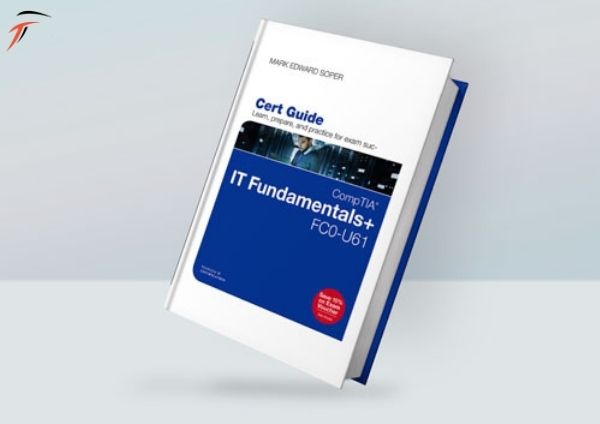معرفی کتاب CompTIA IT Fundamentals+ FC0-U61 Cert Guide

با سلام خدمت همراهان همیشگی فرکیان تک. با شما هستیم با کتاب IT Fundamentals+ FC0-U61 . این کتاب بر مفاهیم اصول فناوری اطلاعات تمرکز کرده است .
معرفی کتاب :
براي موفقيت در آزمون CompTIA IT Fundamentals (ITF+) FC0-U61 با اين راهنماي CompTIA Cert از Pearson IT Certification، پيشرو در يادگيري گواهينامه IT، ياد بگيريد .
اين کتاب با استفاده از عناصر و تکنيک هاي ثابت شده، يک روال آماده سازي آزمون سازمان يافته را به شما ارائه مي دهد
راهنماي مطالعه CompTIA به شما کمک ميکند تا بر تمام موضوعات آزمون مباني فناوري اطلاعات تسلط داشته باشيد از جمله :
مفاهيم و اصطلاحات فناوري اطلاعات :
انواع داده ، ورودي ، پردازش ، خروجي ، ذخيره سازي ، ارزش داده ها و اطلاعات
روش هاي عيب يابي اساسي زيرساخت :
از جمله سختافزار ورودي/خروجي ، راهاندازي/نصب تجهيزات جانبي ، اجزاي کامپيوتر داخلي ، انواع سرويسهاي اينترنتي ، انواع ذخيرهسازي ، دستگاههاي محاسباتي و شبکه ، برنامهها و نرمافزارها
اجزاي سيستمعامل :
انواع و کاربردهاي نرمافزار، معماري برنامهها و مدلهاي تحويل ، پيکربندي مرورگر وب ، مفاهيم کاربردي
مفاهيم توسعه نرم افزار :
شامل انواع زبان هاي برنامه نويسي ، مفاهيم اوليه برنامه نويسي
مسائل امنيتي :
از جمله ( محرمانه بودن ، يکپارچگي ، و در دسترس بودن ، امنيت دستگاه ، امنيت رفتاري ، احراز هويت و مجوز ، بهترين شيوه هاي رمز عبور، رمزگذاري و مفاهيم تداوم کسب و کار )
برای مشاهده تمامی کتاب های زبان اصلی بر روی لینک کلیک کنید .
با ما همراه باشید.
Learn, prepare, and practice for CompTIA IT Fundamentals (ITF+) FC0-U61 exam success with this CompTIA Cert Guide from Pearson IT Certification, a leader in IT Certification learning.
- Master CompTIA IT Fundamentals FC0-U61 exam topics
- Assess your knowledge with practice questions
- Review key concepts with exam preparation tasks
- Practice with realistic exam questions
- Get practical guidance for next steps and more advanced certifications
CompTIA IT Fundamentals Cert Guide is a best-of-breed exam study guide. Leading IT certification expert Mark Edward Soper shares preparation hints and test-taking tips, helping you identify areas of weakness and improve both your conceptual knowledge and hands-on skills. Material is presented in a concise manner, focusing on increasing your understanding and retention of exam topics.
The book presents you with an organized test preparation routine through the use of proven series elements and techniques. Exam topic lists make referencing easy. Chapter-ending Exam Preparation Tasks help you drill on key concepts you must know thoroughly. Review questions help you assess your knowledge, and a final preparation chapter guides you through tools and resources to help you craft your final study plan.
The companion website contains the powerful Pearson Test Prep practice test software engine, complete with hundreds of exam-realistic questions. The assessment engine offers you a wealth of customization options and reporting features, laying out a complete assessment of your knowledge to help you focus your study where it is needed most.
Well regarded for its level of detail, assessment features, and challenging review questions, this CompTIA study guide helps you master the concepts and techniques that will allow you to succeed on the exam the first time.
The CompTIA study guide helps you master all the topics on the IT Fundamentals exam, including:
- IT concepts and terminology, including data types, input, processing, output, storage, the value of data and information, and basic troubleshooting methods
- Infrastructure, including I/O hardware, peripheral setup/installation, internal computer components, Internet service types, storage types, computing devices, and networking
- Applications and software, including software management, operating system components, software types and uses, application architecture and delivery models, web browser configuration, application concepts, and best practices
- Software development concepts, including types of programming languages, programming organization techniques and logic, and basic programming concepts
- Database concepts, purposes, structures, and interfaces
- Security issues, including confidentiality, integrity, and availability; device security; behavioral security; authentication and authorization; password best practices; encryption; and business continuity concepts
